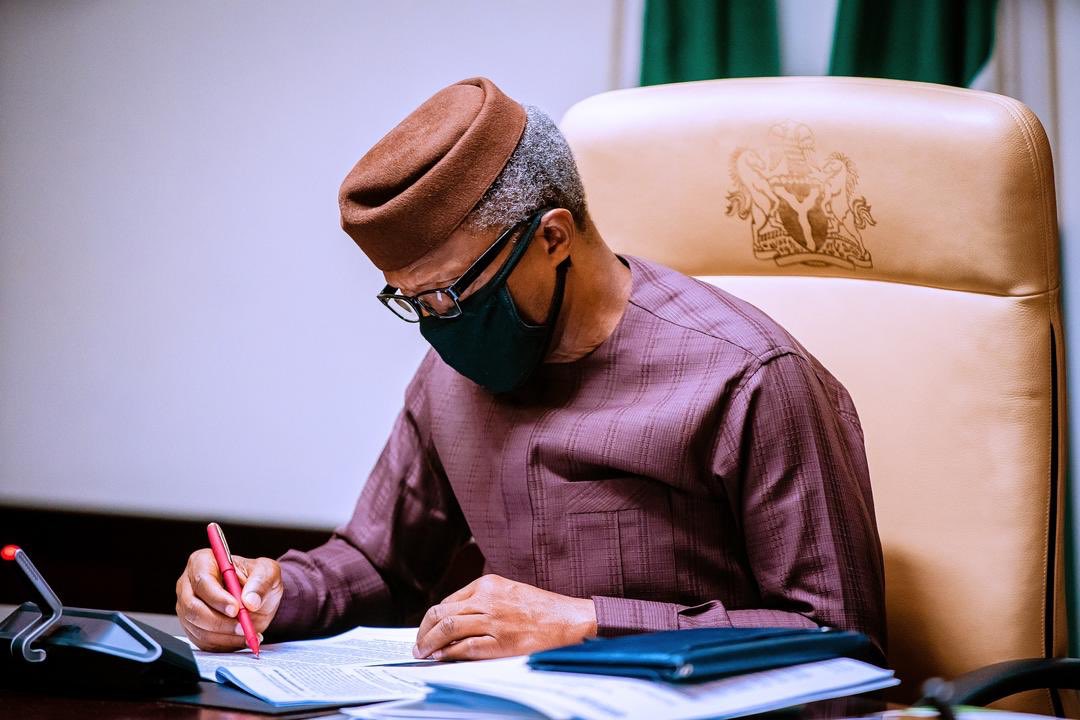On Tuesday July 21, the Chairman of the Senate Committee on Power, Senator Gabriel Suswam, presented a report on ‘Addressing Nigeria’s Power Sector Problems’ for debate at Plenary. As may be expected, the report recounted many of the well-known woes and inadequacies of the Nigerian Power Sector. At the same time, it tried to ascribe reasons to them.
In the course of that, the Senator dwelled on the Azura Power Generating Company and what the transaction was costing the Federal Government.
As may be expected, most papers reported it the next day, but of all of them, the approach taken by the Daily Sun stood out.
Here, we shall take a look at the key contents of the Daily Sun report and place them side by side with the facts on record.
1. In its screaming headlines, the newspaper proclaimed that “Senate targets Osibanjo, Fashola, others over multimillion dollar power deal.”
2. The Daily Sun reports that “Vice President Yemi Osibanjo, Babatunde Fashola and others who were part of the team are believed to have erroneously signed an agreement that was not in favour of Nigeria.”
Fact: Neither Vice President Osinbajo nor Mr. Fashola signed any such agreement. They were not even in office when the Azura agreements were signed. Records show that the Power Purchase Agreement or PPA for the transaction in question was signed on April 22, 2013, during the tenure of the then President Goodluck Jonathan (see below first page of agreement with date shown, as well as the signature page).
It must also be pointed out that the Take or Pay Clause in the Power Purchase Agreement, which obliges Government to pay for power declared available by the company, whether or not it is taken by the Government-owned Transmission Company, is fairly standard, especially where, as in this case, the plant is a huge one requiring enormous set up cost.
3. The Daily Sun went further to say, “The Presidential Power Reform Transaction, which was headed by Osibanjo when the deal was struck obligated Nigeria to pay between $30 million and $33 million monthly to Azura for power for powers generated, even if not “dispatched.”
Fact: Again, this is completely false. Osinbajo was not even in office when the agreement was signed, as far back as in April 2013. The clause which talks about monthly pay is called a ‘Take or Pay Clause’, and in fairness to the government that signed it, that clause is quite typical in Power Purchase transactions. Nobody would build a power plant, which is a very costly and capital intensive venture, and no lender would put money in one, unless someone had committed to pay for the power. At any rate, much of that monthly payment goes straight to Nigeria Gas Company, Nigerian National Petroleum Company and other gas suppliers who make the power generation possible in the first place.
In Nigeria, the company that takes power from electricity Generating Companies is the Nigerian Bulk Electricity Trading Company or NBET for short, which happens to be 100% government owned, hence the commitment to pay for the power was made by the Nigerian Government. It is NBET that buys power from generating companies like Azura and sells to distribution companies. In 2013 when the deal was struck, it clearly appeared to be a good deal for Nigeria, which was desperate for power and feverishly seeking the establishment of power plants.
No one quite envisaged the current situation where electricity generating companies are kept idle because when power is produced, the Transmission Company may not be able to wheel the electricity fully for distribution to customers. It is no longer news that even when the electric power is made available for distribution, the Distribution Companies (DISCOs) at times reject it because they have failed to improve their networks and to meter their customers. The fear of the DISCOs is that they might be unable to deliver the power to customers or to collect tariff. On their part, Customers are reticent to pay because service is appalling and most of them feel cheated by estimated billing.
It should be noted also that payments made to Azura is by no means all for nothing. Azura’s over 80% of Azura’s power is currently being transmitted and distributed, while the rest is being used by the Transmission Company of Nigeria to stabilize the National grid.
4. “Part of the deal the Federal Government had during the power sector reforms was that the investors will have the legitimacy to pull about $1.2 billion from the country’s foreign reserve.”
Fact: No investor can just pull out $1.2 billion or any amount from Nigeria’s foreign reserve like that. There was a Put/Call Agreement signed with Azura as far back as October 22, 2014, whereby Nigeria reserved the option to buy over the assets or the company to give up the assets and seek payment, if Azura defaults (see below first page of agreement with date shown, as well as the signature page). However, the amount to be paid can only be determined when the option is exercised and nobody can simply pull out money from our foreign reserves just like that.
With the agreement having been signed before the inception of this administration, the questions one may ask are “who profits from claiming that it was done by Osinbajo and Fashola? What is the motive behind this mischievous falsehood? And in their desperation to attack these gentlemen, why are they willing to rubbish a company that produces nearly a tenth of our nation’s power with such uncommon transparency and professionalism?
Dr. Rahman writes in from Abuja.
























Leave a comment